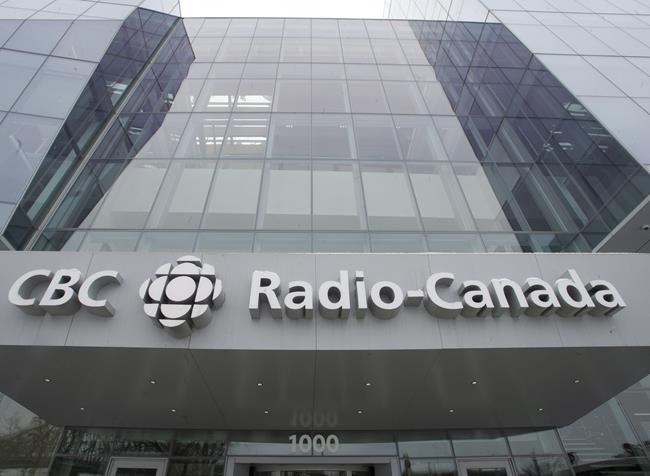
The CBC-Radio Canada building is seen Thursday, January 28, 2021 in Montreal. Heritage Minister Pascale St-Onge says she wants the role of the public broadcaster redefined before the next federal election, to ensure that CBC/Radio-Canada is positioned as well as possible for its future, should there be a change in government. THE CANADIAN PRESS/Ryan Remiorz
Republished December 29, 2023 - 1:20 PM
Original Publication Date December 29, 2023 - 9:11 AM
OTTAWA - The role of the public broadcaster should be redefined before the next federal election, Heritage Minister Pascale St-Onge says, as the Liberals hedge against a possible change in government.
In a year-end interview with The Canadian Press, St-Onge said now's the time for her Liberal government to begin working with Canadians and experts to define what the CBC should like over the next year and decade.
"And I really want to achieve that before the next election, to make sure that our public broadcaster is (as) well-positioned as possible for the future," St-Onge said.
Canada's news and cultural sectors would be at serious risk should the Conservatives form government under leader Pierre Poilievre, St-Onge said, adding it has her thinking about the next election and what she believes is on the line.
"(Conservatives) have shown they think that the arts and cultural sector should be left to the free market," she said.
"And we know that with foreign companies and foreign entities that take so much space online, and in Hollywood and in San Francisco, it means that we would basically abandon our cultural sector in Canada."
The Opposition Tories have promised to defund CBC and turn its Toronto-based headquarters into "affordable housing," though Poilievre has also suggested maintaining support for services tailored to francophone minorities.
"Canadians need an independent and free media, not a biased broadcaster that receives a billion taxpayer dollars every year to act as mouthpiece for the Liberal government," Conservative heritage critic Rachael Thomas said in a statement.
CBC/Radio-Canada's independence from the government is enshrined in law through the Broadcasting Act, and its public funding is voted on by all MPs.
St-Onge said preserving the French-language service while cutting CBC is "absolutely unachievable" because the two are intertwined and rely on the same resources, employees and workspaces.
"The public broadcaster is something that's available from coast to coast to coast, and I don't see how Canadians would accept we only fund CBC/Radio-Canada in Quebec or French communities," she said.
The federal Liberals have been promising for years to update CBC's mandate to meet the modern needs of Canadians, even as the news industry faces job cuts and declining ad revenue.
That includes recently announced cuts at CBC/Radio-Canada, which said early this month it was planning to eliminate about 600 jobs and let an additional 200 vacancies go unfilled as it contends with a $125-million budget shortfall.
"I was at Radio-Canada not too long ago for the recording of a show, and you can feel how this is impacting employees' morale," St-Onge said.
"There's a lot of uncertainty and unpredictability. People weren't informed exactly how and if those cuts do happen, how it will be done and achieved. So it's a difficult time."
In May, former heritage minister Pablo Rodriguez said he had started to review CBC's mandate, including ways the government can bolster funding to the public broadcaster so it is less reliant on advertising dollars.
Under the government's Online News Act, CBC/Radio-Canada will get up to $7 million in a deal the government struck with Google months after St-Onge took on the new role.
"But there is still uncertainty until the next federal budget," St-Onge said.
In the 2022-23 fiscal year, CBC/Radio-Canada's annual report shows it received nearly $1.3 billion from government funding, with another $515 million coming in through other revenue such as advertising.
When it comes to journalism, St-Onge said she would like the broadcaster's new mandate to fill information gaps in local regions, include a strong online presence, invest in international reporting and ensure minority-language communities are supported.
As for the cultural sector, she said she would also like to see the public broadcaster continuing to showcase local talent and finance shows "that would not see the daylight if it was just for the private sector."
"I think it's time we do it now because the Liberal party comes from the perspective that we do need a strong public broadcaster, and we will continue to support it," St-Onge said.
CBC/Radio-Canada will assist in the mandate review in any way possible, said Leon Mar, a spokesperson for the public broadcaster.
Beginning next year, the Canadian Heritage Department will put together a committee to find a new head of CBC who can lead the public broadcaster into its transformation, St-Onge said.
Catherine Tait, current CEO and president of CBC/Radio-Canada, is slated to stay in her role until 2025.
This report by The Canadian Press was first published Dec. 29, 2023.
News from © The Canadian Press, 2023